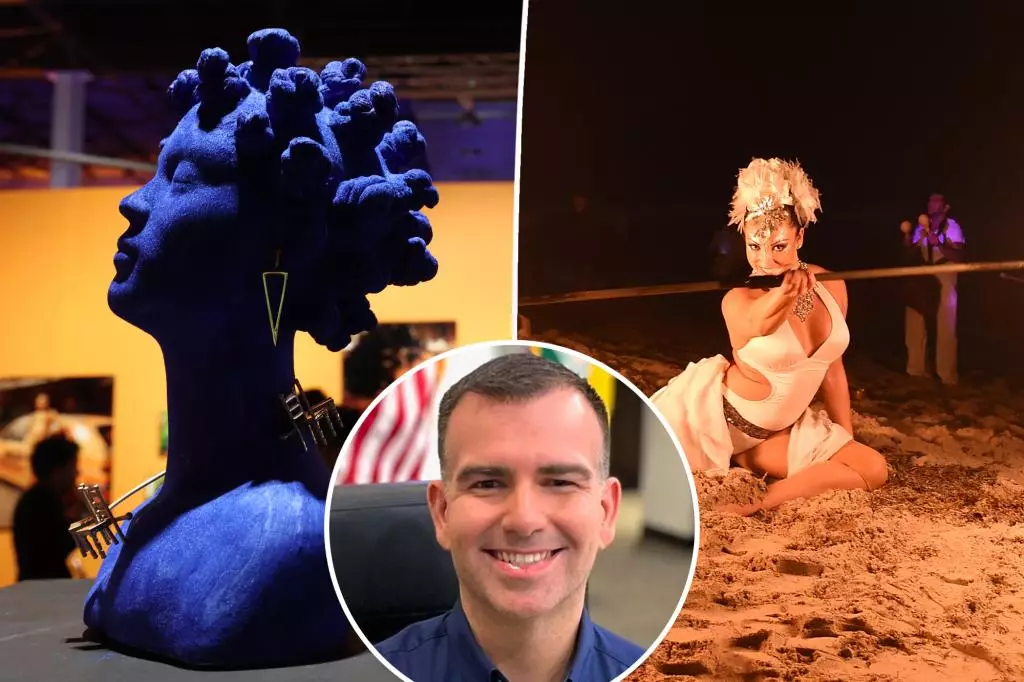Miami Beach, a renowned hotspot known for its vibrant nightlife and cultural events, is once again in the spotlight as the city’s high society rebels against a new set of regulations aimed at controlling large-scale parties during the upcoming Art Basel. This clash pits the interests of wealthy homeowners against city officials focused on maintaining public safety and order amid a crowded calendar of glamorous events. As the debate unfolds, the implications for both residents and the broader community become increasingly complex.
In a bold move, three prominent figures from Miami Beach’s elite—plastic surgeon and reality TV star Leonard Hochstein, Farmasi CEO Sinan Tuna, and party aficionado Daniel Vincent Liburdi—have sought to challenge the city’s newly enacted rules through a legal motion. Claiming they have collectively invested around $4 million in extravagant parties, the trio argues that the new resolution passed on November 20 infringes upon their rights to host large social gatherings without unnecessary governmental interference.
The new regulatory framework mandates that events featuring sponsors, music, and significant entertainment components receive permits prior to execution. Non-compliance could result in severe penalties, including arrest. This has prompted the multi-millionaire hosts to decry their impending financial losses and potential legal ramifications as fundamentally unjust. They insist their elaborate celebrations were regulated under previous standards and should not face last-minute changes that would jeopardize their financial commitments to vendors and guests.
Miami Beach Vice Mayor Alex Fernandez has vigorously defended the city’s new restrictions, asserting that unregulated, commercial-grade parties have historically led to severe disturbances within the residential communities. Describing the events as nuisances that disrupt neighbors’ quality of life, he emphasizes that the regulations were enacted to ensure safety and provide a structured permitting process for large gatherings.
Fernandez argues that while the city appreciates the cultural significance and economic benefits of events surrounding Art Basel, the critical point of contention lies in prioritizing residents’ needs. The goal is to strike a balance that allows for celebration without compromising safety or accessibility. He suggests that large-scale gatherings must be located in appropriate venues rather than congested residential streets where emergencies could be hindered by excessive traffic and noise.
Art Basel, which runs from December 6 to 8, is an overarching event that attracts international attention and drives significant business for local entrepreneurs. Those hoping to capitalize on the influx of art enthusiasts often look to host associated parties that appeal to affluent guests. However, the city’s crackdown paints a stark picture of the fine line between celebratory spirit and chaotic exploitation of cultural events.
The new regulations stem from numerous complaints from residents, which often detail incidents of excessive noise, safety issues, and blocked emergency access. Many locals cite their frustrations with the unruly crowds birthed from elaborate gatherings, leading to a broader discussion about the quality of life in desirable neighborhoods—this is compounded by the fact that other celebrity residents like Shakira and Gloria Estefan reside nearby.
A Broader Discussion: Cultural Prestige versus Local Integrity
As the debate rages on, the core issue has expanded beyond regulatory disputes into a larger discourse surrounding the authenticity and integrity of Miami Beach’s cultural events. Vice Mayor Fernandez criticized unauthorized parties as opportunistic enterprises that “exploit” the prestige associated with Art Basel. He asserts that without oversight, these unauthorized events could tarnish the reputation of one of the most celebrated art fairs in the world and undermine the cultural sophistication it aims to promote.
Caught in this tension, residents are compelled to reflect on their values. The allure of lavish celebrations competes with the desires for tranquility and community harmony, igniting intense discussions about the future of social gatherings in Miami Beach. At the heart of the matter lies a critical question: how can a city foster cultural vitality while simultaneously safeguarding its residents’ rights and experiences?
As Miami Beach’s elite clamor in court for the right to preserve their extravagant soirees, the forthcoming legal hearing promises to be a litmus test of the city’s commitment to its residents and stakeholders alike. The outcome may set a precedent for how future celebrations in this renowned destination are regulated, ultimately defining what it means to party in Miami Beach amidst the ever-evolving landscape of culture, governance, and societal expectations.
In this dynamic tussle between high society and municipal authority, the rich tradition of revelry stands at a crossroads—one that could reshape the social fabric of Miami Beach for years to come.
